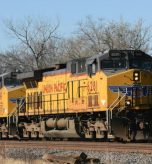Executive Summary | Current State of the US Trucking Industry for Transportation Logistics Consultants
APRIL 2025 UPDATE
Since the full implementation of President Trump’s reciprocal tariffs earlier this month, the US trucking industry has experienced significant volatility not seen since the pandemic era. Initial data from April reveals a 41% month-over-month decline in freight bookings nationwide, with western regions seeing drops exceeding 50%. Cross-border terminals handling Mexico freight are reporting volume reductions of 20% or more, while numerous customs processing delays have created additional operational challenges. The expected equipment cost increases of up to $35,000 per new truck are now materializing, forcing many carriers to extend existing fleet lifecycles. A significant customs system “glitch” affecting exemption codes lasted more than 10 hours in mid-April, adding to what industry insiders have termed “tariff whiplash.” Meanwhile, the semiconductor shortages that were expected to ease by early 2025 persist, creating a dual challenge of higher equipment costs and limited new vehicle availability.
After spending decades in this industry and observing its evolution through multiple economic cycles, our transportation consultants would like to share expert perspective on what trucking executives should expect in the next 6-12 months. The landscape presents a combination of familiar challenges alongside unprecedented policy shifts that will require strategic adaptation from all industry participants – insights valuable to transportation consulting firms and logistics professionals alike.
Market Recovery: Transportation Supply Chain Management Insights
After nearly three years of a freight recession that’s tested even the most resilient operators, the trucking supply chain is finally witnessing signs of modest recovery. The ACT Freight Composite Index is projecting 2.1% year-over-year growth in Q1. While this isn’t the robust rebound some analysts predicted, after the extended downturn we’ve endured, steady growth represents welcome progress for transportation management consultants and industry stakeholders.
Reliable transportation logistics consultants advise that trucking executives would be wise to approach this recovery with disciplined restraint. Companies should avoid overextension, keeping capacity growth measured and deliberate. The market is clearly rebalancing, but this recovery displays notably different characteristics than previous cycles.
The load-to-truck ratio has stabilized around 7.8, suggesting a move toward equilibrium, though an overcapacity environment persists in certain segments. Vocational trucking continues to show strength, supported by ongoing infrastructure investments. Meanwhile, the dry van sector faces continued margin pressure due to persistent overcapacity – factors all trucking consultants must consider when advising clients.
Tariff Policies: Critical Considerations for Trucking Supply Chain Resilience
The administration’s tariff policies represent the most pressing near-term challenge for the transportation supply chain management sector. The 25% tariffs on goods from Mexico and Canada and 10% on Chinese imports are creating significant disruptions in cross-border operations. Companies with substantial cross-border freight volume, particularly through Southeastern and Gulf Coast terminals, are experiencing this impact directly.
Transportation consulting firms have identified three immediate challenges that require attention:
First, they’re significantly increasing equipment costs at a time when many fleets are just regaining financial stability. Price increases of potentially $35,000 per new tractor translate to millions in additional capital expenditures—resources that would otherwise go toward driver retention programs and technology investments.
Second, cross-border volume is experiencing substantial disruption. Terminals that handle Mexico cross-border freight are seeing volume reductions of 20% or more. Canadian routes are similarly affected, with Northeast operations reporting significant declines in northbound loads.
Third, the wider supply chain ripple effects are concerning. The automotive sector is particularly vulnerable given its integrated North American supply chain. Components crossing borders multiple times means the effective tariff rate compounds significantly.
Transportation management consultants recommend carriers consider diversifying their customer base away from heavily tariff-impacted sectors and implementing more flexible capacity allocation. Enhancing domestic intermodal partnerships can offset some cross-border exposure. These aren’t permanent solutions, but they allow time to adapt if these policies remain in place.
Supply Chain Resilience: Expert Analysis from Transportation Consultants
Another significant challenge stems from continued semiconductor supply chain issues. Despite forecasts projecting normalization by early 2025, persistent constraints particularly impact newer, technology-equipped vehicles.
Trucking consultants note these semiconductor challenges present a dual impact. They’re limiting the pace at which new trucks enter the market, which helps mitigate overcapacity concerns. Simultaneously, they’re increasing repair costs and causing extended downtime for existing equipment. Many carriers report vehicles sidelined for weeks awaiting electronic control modules.
TSMC’s Arizona plant was intended to alleviate some of these pressures, but delays in reaching full production capacity suggest these challenges will persist through much of 2025. Transportation logistics consultants recommend fleet managers consider extended preventative maintenance schedules and maintaining strategic reserves of critical electronic components. Diversifying OEM relationships can also reduce dependence on any single supply chain.
Operational Costs: Strategic Guidance from Transportation Management Consultants
Driver compensation remains the largest cost center at approximately 32% of operating expenses for most carriers. Transportation consulting firms advise maintaining competitive compensation despite the freight recession is advisable because quality drivers remain the industry’s most valuable asset. Experience confirms that retention is significantly more cost-effective than recruitment.
Fuel costs, typically the second-largest expense at approximately 28% of operating costs, have stabilized somewhat but remain historically elevated. The 10% tariff on Canadian energy imports creates additional uncertainty. Hedging strategies provide some protection, but energy costs will remain a variable factor, particularly given ongoing geopolitical tensions.
Insurance premiums continue their upward trajectory. The trucking supply chain industry has seen nearly a 24% increase in the past three years, moving from 7.1 cents to 8.8 cents per mile. For larger fleets, that equates to millions in additional overhead annually.
Technology Adaptation: Recommendations from Trucking Consultants
Despite these headwinds, maintaining technology investment roadmaps is crucial. Companies implementing AI-powered route optimization are seeing 4-5% improvements in asset utilization, even in this challenging environment. Predictive maintenance platforms are reducing unplanned downtime by 20% or more compared to traditional maintenance approaches.
Autonomous technology remains on the strategic horizon, but not as an immediate priority for most carriers. The regulatory environment is still evolving, and the capital requirements remain prohibitive. That said, trucking consultants recommend engagement in pilot programs ensures understanding of the operational implications when wider deployment becomes viable.
Outlook and Strategy: Transportation Supply Chain Management Forecast
Looking ahead to the next 6-12 months, transportation logistics consultants expect continued moderate growth in freight demand offset by persistent cost pressures and tariff-related disruptions. The net effect will be margin compression for operators who haven’t adequately prepared.
Transportation consulting firms recommend a sound strategy for navigating this environment should center on four pillars:
- Operational flexibility: Maintaining the ability to rapidly shift capacity between market segments as demand patterns evolve.
- Relationship depth: Strengthening established shipper relationships where trust enables transparent conversations about tariff-driven cost increases.
- Technology leverage: Implementing productivity-enhancing technologies that improve utilization and reduce empty miles.
- Strategic restraint: Resisting the temptation to chase volume growth at the expense of profitability, particularly in market segments still plagued by overcapacity.
For smaller operators and owner-operators, the next year will be especially challenging. They lack the scale to absorb equipment cost increases and have less leverage with shippers when pushing through necessary rate adjustments. Further consolidation in the industry appears inevitable, making the guidance of experienced trucking consultants even more valuable.
Conclusion: Transportation Management Consulting for Industry Resilience
The trucking industry has always been cyclical, but the pressures we face today combine typical market dynamics with unprecedented policy shifts and global supply chain realignments. Companies with strong balance sheets, operational discipline, and strategic clarity will not just survive but emerge stronger.
Managing through headwinds requires both defensive positioning and selective offensive moves. While exercising fiscal discipline in certain areas, transportation consultants simultaneously recommend investments in capabilities that will differentiate when the freight environment inevitably improves.
America’s economic backbone depends on a healthy trucking supply chain. Despite the challenges ahead, transportation logistics consultants remain confident that our sector will adapt and continue to move the nation’s goods efficiently, safely, and reliably. The road ahead has some difficult stretches, but with careful navigation and expert guidance from transportation consulting firms, the industry will reach its destination.















